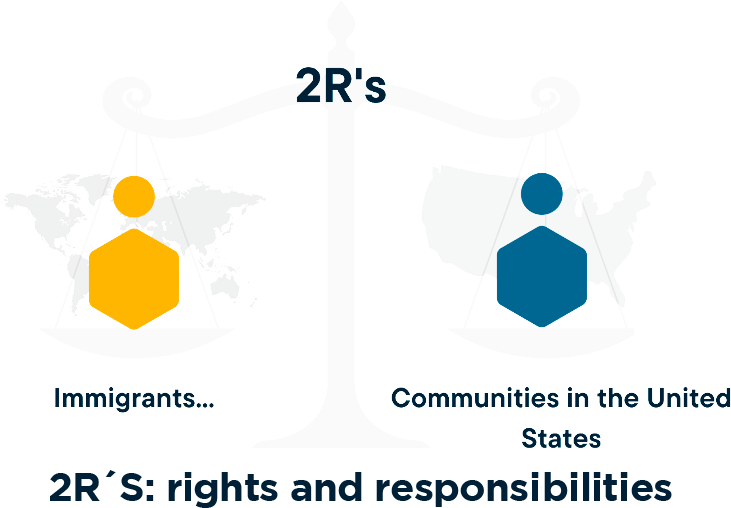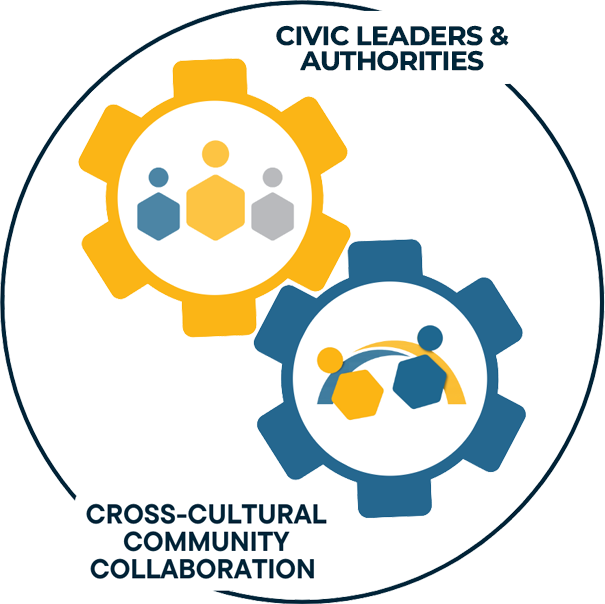

The Polidore Foundation is dedicated to supporting Hispanic immigrants as they journey across the United States, helping them to adapt, gain acceptance, and thrive in their new communities. Through our Civic Education Program, we provide immigrants the critical training and resources to prepare them for careers as civic leaders as well as role models for fostering peaceful coexistence in diverse communities across the U.S.
Our mission is rooted in the Rule of Law, always focused on advocating respect for local laws and regulations thereby ensuring that ALL members of the community are treated fairly under the law. Polidore is committed to combating discrimination and creating an inclusive environment where every community member can realize their full potential.
Recognizing the immigrant community´s vast talents, industrious qualities and limitless potential, the Polidore Civics Program emphasizes the importance of educating ALL immigrants on their rights but also on their responsibiliites as community members, helping them to avoid common pitfalls and build better lives.
The Polidore Civics Program consists of two fundamental components:
1. Pop-Law (The Rule of Law): Underlines the importance of civic education and an understanding of and respect for the Rule of Law including the social norms prevailing in the U.S., and
2. Bridging the Divide (Promoting Civic Education for A Stronger, More Cohesive, Diverse Community): Civic education is essential for effective cross-cultural communcation, adaptability, and collaboration between the Community and the Public Sector.
“It is all about future civic leaders”
This program consists of developing civic leaders who will serve as role models within their communities.
The Polidore Civics Program trains participants in their chosen career fields by:
1) Providing basic instruction to educate participants on the challenges they will face;
2) Inviting leading authorities on topics of interest that will enhance participants’ perspectives through exposure to real-life situations; and
3) Creating opportunities to meet with public sector officials and job recruiters to educate participants on the opportunities available in civic leadership.
Mentorship
Mentorship will be a key component of the Polidore Civics Program. Upon enrollment All participants are assigned a mentor who will provide ongoing guidance and direction to prepare them for the challenges that lie ahead as civic leaders. As part of the program, each participant will research, prepare and present to the Class a Civics Program Project that will be approved in advance by both the Foundation and the participant’s mentor.
The Polidore Civics Program works in a 4 Poli-Gear Model ⚙︎ process:

“Make the Law accessible to all”
Civic engagement is the pillar that supports the structure of a democratic and participatory society. It translates into the active involvement of citizens in the social, political, and economic dynamics of their community with the aim of fostering positive and sustainable change.
Polidore's primary aim is to foster awareness that althought the U.S. is a land of opportunity, it is critical for immigrants to be suficiently educated so that they can navigate the complex U.S. legal framework and its web of many regulations.
We need to develop civic leaders who understand and recognize the importance of living in a society where the Rule of Law and civic education is an essential tool in a diverse, cross-cultural environment.

Building bridges of dialogue and understanding between community members and public sector officials is essential to fostering civic leadership. Encouraging open and effective communication allows communtiy members to air their concerns, and government to understand and respond to the needs of the community
At Polidore, civic leadership consists of developing immigrant visionaries with a strong sense of integrity and fairness together with effecive communication skills for roles as civic leaders. These qualities as well as the potential to understand the continually changing needs of the community are key to building a foundation of trust within the public sector and will enable civic leaders to make decisions that inspire all community members to persevere, be resilient and realize their full potential.
By fostering these values, at Polidore, we develop responsible leaders who will create a lasting positive impact on their communites.
